WHAT IS QNW
Founded in 1974, Quebec Native Women Inc. (QNW) represents women from the Indigenous Peoples in Quebec and Indigenous women living in urban areas.
We sit at the table of the Assembly of First Nations of Quebec and Labrador, on the Board of Directors of the Native Parajudicial Services of Quebec as well as several other Indigenous and non-Indigenous commissions and committees.
HISTORY
History of the steps to the establishment of and the political, legal and social struggle of
Québec Native Women (QNW)
- 1968
- 1971
- 1973
- 1974
- 1975
- 1976
- 1977
- 1979
- 1980
- 1982
- 1984
- 1985
- 1987
- 1989
- 1990
- 1991
- 1992
- 1993
- 1994
- 1995
- 1996
- 1997
- 1998
- 1999
- 2000
- 2001
- 2002
- 2003
- 2004
- 2005
- 2006
- 2007
- 2008
- 2009
- 2010
- 2011
- 2012
- 2013
- 2014
- 2015
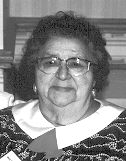 1968
1968
Establishment of the “Equal Rights for Native Women” association, headed by Mary Two-Axe Earley, a Mohawk from Kahnawake.
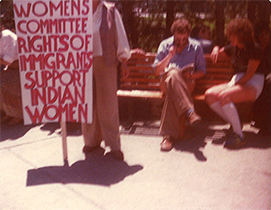 1971
1971
Establishment of the Native Women’s Association of Canada (NWAC)
Establishment of the “Indian Rights for Indian Women” association, the national arm of “Equal Rights for Native Women.”
Establishment of the Ontario Native Women’s Association
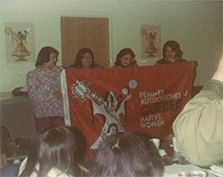 1974
1974
Establishment of Québec Native Women’s Association (QNW).
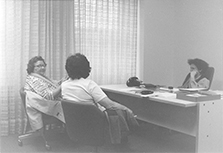 1975
1975
As part of International Women’s Year, Mary Two-Axe Earley traveled to Mexico to present a brief on the discrimination faced by Indigenous women.
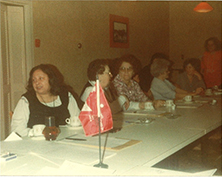 1976
1976
Research undertaken by QNW with 369 women and 66 men mostly living on reserves in Québec demonstrates a 90% dissatisfaction rate with the Indian Act and its discriminatory clauses. The findings are published in a document entitled “Wake-Up Native Women!” The document, in which QNW recommends that an Indigenous woman retain her status even if she marries a non-Indigenous person, is sent to the Committee to amend the Indian Act, and to numerous other Indigenous and women’s organizations throughout the country.
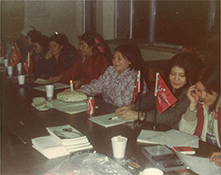 1977
1977
QNW opens the first position for a coordinator, which will allow them to maintain direct links between the executive and local groups.
QNW presents a brief to a parliamentary commission on the issue of Indigenous children being adopted into non-Indigenous families.
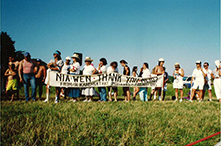 1979
1979
A group of women from the Tobique reserve in New Brunswick sets out on a 110-mile march from Oka (Kanesatake) to Ottawa to mark the 110 years of injustice experienced by Indigenous women since the passing of the Indian Act.
QNW obtains its first operating funds from the federal government (Secretary of State) and the provincial government (SAGMAI).
A QNW brief on “Health Services: A Crucial Problem Among the Aboriginal Population of Québec” is sent to various Québec and Canadian ministries, institutions and organizations.
QNW produces a brief outlining the necessity of transmitting Indigenous culture and the need to hire Indigenous teachers in schools attended by Indigenous students.
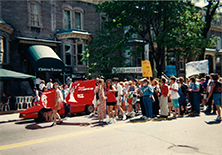 1982
1982
QNW files a document on the discrimination faced by Indigenous women to the sub-committee of Indian Affairs. This document is discussed in the House of Commons.
Adoption of the Canadian Charter of Human Rights and Freedoms which guarantees equality between men and women. It was not until 1985 that it was applied to the Indian Act.
The Québec government meets with First Nations and Inuit representatives in the province, including the Québec Native Women’s Association, in order to initiate discussions on Indigenous rights and the Constitution.
Brief presented to the Common Front for Aboriginal Women and Economic Development.
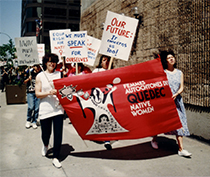 1985
1985
Adoption of Bill C-31, which amends the Indian Act. From now on, Indigenous women retain their status under all circumstances.
Launch of the awareness campaign, “Violence is Tearing Us Apart ‚ Let’s Get Together.”
Creation of Defence Fund for women who are victims of discrimination.
Presentation of a brief on Indigenous daycare services to the public hearings of the Parliamentary commission on this issue.
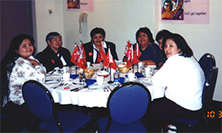 1989
1989
Presentation by QNW at the National Aboriginal Inquiry on the Impact of Bill C-31.
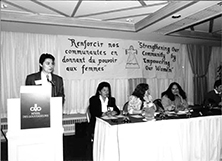 1990
1990
Publication of a bilingual newsletter (French and English) “Together Against Violence. Anishnabé-Kwe,” which identifies ways of preventing family violence in Québec and Canada. Due to lack of adequate financial support, publication of the newsletter ceases after its third issue.
QNW makes public the Proposal for an Approach that Includes Intervention in the Area of Family Violence.
Creation of a working group on violence.
QNW participates in the “Measure 24” multidisciplinary group, established as part of the Department of Health and Social Services three-year plan on violence in the Indigenous milieu.
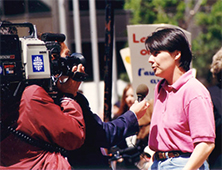 1992
1992
Brief dealing with the Canadian Constitution presented to the First Nations Circle. Québec Native Women’s Association supports self-government, but demands a guarantee regarding the protection of rights and freedoms for all Indigenous citizens.
Revision of the QNW Constitution and Rules.
Québec Native Women is recognized by the Assembly of First Nations’ provincial section. The Association can now participate in all discussions, but is not entitled to vote.
QNW past president, Michèle Rouleau receives the “Droits et Libertés” Prize for her contribution to promotion of Indigenous women’s rights.
Publication of a study entitled “An Assessment of Violence and Mental Health Among the Aboriginal Population of Québec.” A QNW brief to the Royal Commission on Indigenous Peoples, entitled “Taking Our Rightful Place,” recommends the following:
- Prioritize the issue of family violence
- Create daycare centres in Indigenous communities
- Examine the issue of multi-service centres for Indigenous women living in urban areas
- Modify Bill C-31 since it opens up new avenues of discrimination
- Ensure the participation of Indigenous women in the constitutional debate
- Ensure equal financial support for Indigenous women’s organizations
First meeting of the QNW ad hoc Committee on conjugal violence. The committee is made up of five Indigenous men.
QNW past president Michèle Rouleau becomes Chevalier de I'Ordre national du Québec.
Brief presented to the Permanent Committee for Human Resources Development on Social Security Reform.
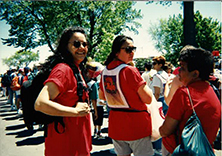 1995
1995
Launching of a booklet on violence entitled “Beyond Violence.”
First conference on violence, entitled “This is the Dawn I,” is held in Montréal.
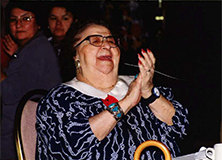 1996
1996
Publication of the booklet entitled “Our Families. A world to discover.” This booklet was produced for the “Table de concertation québécoise sur la famille,” through a partnership between QNW and “Institut national de la recherché scientifique” (INRS).
Passing of Mary Two-Axe Earley.
Québec Native Women organizes a three-day conference on economic development.
Second conference on violence entitled “Pimadiziwin, This is the Dawn II,” is held in Montréal.
Past president of QNW, Monique Sioui, posthumously receives the “Droits et Libertés” Prize.
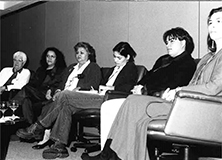 1999
1999
25th anniversary of Québec Native Women.
Awareness tour as part of the “Kassewe: For a common vision of solidarity in the First Nations communities of Québec” project.
QNW participates in the World March of Women and calls for increased funding for Indigenous women’s shelters.
Setting up of a training session entitled “Drum Beats of the Youth” for young women and men, on democracy, civil rights and civic education.
Organization of a seminar on justice and public security entitled “Improving the welfare of our youth.”
QNW receives an Honourable Mention from the Québec Human Rights and Youth Rights Commission for its outstanding contribution to the promotion of human rights and freedoms in Québec.
QNW organizes the “Women for Peace” event, which brings together 25 Indigenous women at the ceremonies to commemorate the 300th anniversary of the Great Peace of Montréal.
Holding of the Apitendemowin seminar on sexual abuse.
Third conference on violence entitled “Skennekὸ: wa This is the Dawn III.”
In the context of the Takuaikan project carried out in partnership with Éducaloi, QNW launches its first series of legal information capsules entitled “Legal Information for Aboriginal People.”
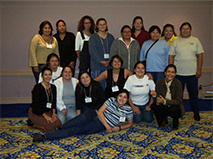 2002
2002
QNW launches a Canada-wide petition against the Indian Act.
QNW organizes the Kanikanitet leadership training session for young Indigenous women.
QNW participates in the first summit of Indigenous Women of the Americas, held in Oaxaca, Mexico.
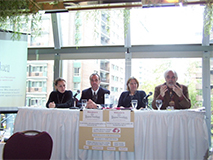 2003
2003
QNW organizes the Innu Tipenitemun human rights training session for young Indigenous women and men.
In the context of the Takuaikan project, QNW launches its second series of legal information capsules.
Holding of the seminar “Minuinniu Innushkueu: For a common vision of the promotion of women’s health.”
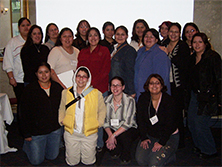 2004
2004
Celebration of the 30th anniversary of Québec Native Women.
Participation in the discussions of the United Nations Permanent Forum on Indigenous Issues on the topic of Indigenous women.
QNW organizes the Québec Aboriginal Young Women’s Gathering, the first of its kind in Québec and Canada.
Québec Native Women and the Fédération des femmes du Québec sign a Solemn Declaration of Solidarity.
QNW publishes a discussion paper entitled Division of matrimonial real property on reserves.
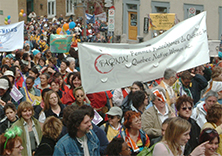 2005
2005
Report entitled “Mémoire sur l’égalité : point de vue des femmes autochtones” presented to the Commission of Social Affairs as part of the review process of the council of Status of Women.
In collaboration with DIALOG—Québec Network on Aboriginal Issues, organization of the conference held in Montréal entitled Moving Towards Equality.
Participation in the World March of Women in Québec.
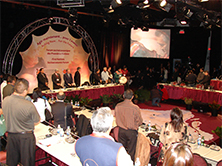 2006
2006
Participation in the working table leading to the Socio-Economic Forum for First Nations held at Mashteuiatsh between October 25 - 27.
QNW puts forward Indigenous women’s needs in relation to family and sexual violence and asks for more support from both federal and provincial governments.
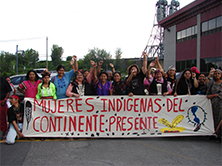 2007
2007
QNW organizes the Fifth Summit of Indigenous Women of the Americas in Kahnawake with the Continental Network of Indigenous Women (ENLACE).
QNW participates at both national and provincial campaigns demanding that Canada endorse the UN Declaration on the rights of Indigenous peoples.
For the first time, QNW organizes a demonstration in the streets of Montréal on September 13, 2007.
Ellen Gabriel is awarded a special recognition on March 8 by the Québec Bar Association for her remarkable contribution to women’s and family rights through a non-profit organization.
Launch of the Campaign “Together against family violence!” in Wendake in May: a purple sticker can now be seen in every window of every community throughout Québec.
Launch of the Ishketeu training on domestic violence.
QNW obtains the United Nations ECOSOC observer status for non-governmental organizations.
Québec Native Women celebrates its 35th anniversary.
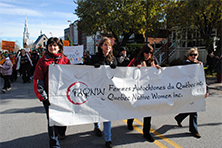 2010
2010
Adoption of Bill C-3 following Sharon McIvor’s victory before the Court of Appeal of British Columbia, which entitles the grandchildren of women who regained their status in 1985 to claim their Indian status.
QNW supported Sharon McIvor’s fight from the beginning in 1989 and lobbied to have Bill C-3 be as fair as possible to Indigenous women and their descendants.
Launch of the Wasaiya project: a training of trainers on the rights of Indigenous peoples in both anglophone and francophone Québec Indigenous communities in partnership with the Université du Québec à Montréal.
QNW participates in the negotiations for the Nagoya Protocol on Access and Benefit-sharing in Montréal, Cali (Colombia) and Nagoya (Japan). This international instrument aims at protecting Indigenous traditional knowledge and biodiversity on their territories as part of the Convention on Biological Diversity.
First meeting of Inuit and First Nations Directors of Women’s Shelters in Kuujuaq.
Participation in the World March of Women in Rimouski. As one of their demands, the Québec Coalition demanded the ratification and implementation of the UN Declaration on the Rights of Indigenous Peoples.
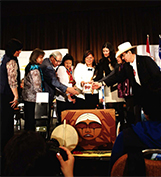 2011
2011
Launch of the Campaign “My sexuality it’s about respect: break the silence!”
Co-organization of the International Forum on the Social and Solidarity Economy “Women at the Heart of the Social and Solidarity Economy.” More than 1,000 people from 40 countries were expected.
Québec Native Women proudly supports the Innu Ishkueu March to denounce the Plan Nord and to remind the government of the obligation to consult and take into consideration the decisions of the First Nations peoples.
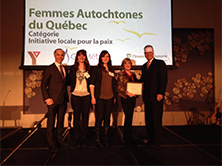 2013
2013
QNW participates in the Idle No More movement and stands in solidarity with Chief Theresa Spence in their action remind us all of the history of colonization in Canada.
Ellen Gabriel refuses the Queen Elizabeth II Diamond Jubilee Medal, but accepts the recognition of Québec Native Women for her commitment to Indigenous Women.
QNW launches a petition to reform the high school history curriculum to include the history of Indigenous peoples, including the residential schools episode and gathers more than 4,000 signatures.
QNW sends a report to James Anaya, UN Special Rapporteur on Indigenous Issues, denouncing the unstated paternity policy which continues to discriminate against Indigenous women. The Special Rapporteur concluded his visit by reminding the Government of Canada of the urgency of establishing a national commission of inquiry into the situation of missing and murdered Indigenous women.
Launch of QNW’s awareness campaign for Indigenous men with violent behaviour.
QNW receives the YMCA Peace Medal.
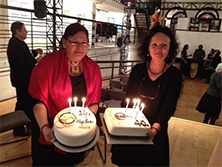 2014
2014
QNW and the National Aboriginal Council of Midwives launch a tool to encourage the development of a midwifery practice.
QNW demands a national inquiry following the RCMP report on the 1,186 cases of missing and murdered Indigenous women.
Launch of the campaign against trafficking in Indigenous women “I am a proud Indigenous woman and I am not for sale.”
QNW celebrates its 40 years of fighting for the rights of Indigenous women.
Indigenous and Northern Affairs Canada (INAC) recognizes QNW as an Indigenous Representative Organization (IRO).
QNW launches its report on Missing and Murdered Indigenous Women in Québec “Nānīawig Māmawe Nīnawind—Stand With Us.”
MISSION
Together and united, Indigenous women will have achieved equality and justice. Indigenous women want to live in an environment that respects their rights and aspirations. They want a harmonious future with justice and equality.
We represent and defend the interests of all Indigenous women across Quebec in order to improve their living conditions through advocacy for equality, justice, non-violence, education, health, and economic and social
security. Through mobilization and unity, we will act for greater autonomy and participation of women in all spheres of society.

Our Actions
In unison with Indigenous Peoples, we support self-government and are working to assure that Indigenous women have full and total participation in this process.
On the social and economic scenes, we are involved in the promotion and development of new training initiatives for Indigenous women to help improve their lives and that of their families. These initiatives also allow them to participate more fully in their communities.
COUNCIL OF ELECTED REPRESENTATIVES
Québec Native Women (QNW) consists of a 17-member Council of Elected Officers: three Executive members, nine representatives from the Nations, one representative of Indigenous women living in an urban centre, one youth representative, one elder representative, one employee representative and the Executive Director. One representative from each nation and one representative from the urban centres are elected by their members at Nation Council meetings every second year and sit on the Elected Council.
Young women are represented by a QNW Youth Council which brings together one young woman from each Nation chosen at the Councils of Nations. One youth representative elected by the Youth Council sits on the Elected Council. The Elder women also have one representative for each Nation and one of them is chosen to sit on the Elected Council. Furthermore, since May 2015, one employee representative also sits on the Elected Council but has no voting rights, the same as the Executive Director.
Finally, the Executive Committee of the Elected Council is composed of three positions elected at the Annual Gathering of Members every two years: The President, the Vice-President and Secretary-Treasurer. The President acts as the spokesperson for the Association.
Council of Elected Representatives:
Executive council
President: Marjolaine Étienne
Vice-President: Jeannette Martin
Secretary-Treasurer: Sonia Chachai
Representative of the Nations
Abenaki Nation: Florence Benedict
Anishinabe Nation : Sammy Kistabish
Atikamekw Nation : Sonia Chachai
Eeyou Nation : Charlotte Ottereyes
Huron-Wendat Nation : Mélanie Savard
Innu Nation: Kathy Picard
Mi’gmaq Nation: Jeannette Martin
Mohawk Nation: Gabrielle Lamouche
Naskapi Nation: Annie Tooma
Wolastoqiyik (Malecite) Nation : Véronique Larouche
Urban Area: Hélèna Lalo
Youth Representative: Ève Custeau-Wiscutie
Elder Representative: Jackie Kistabish
Executive Director: Laura Rock (by interim)
Employee Representative: Sophia Dupont
Employees
CLICK ON THE PERSON OF YOUR CHOICE.MARJOLAINE ÉTIENNE
PresidentMarjolaine Étienne has been President of QNW since 2021. Marjolaine is the spokesperson for QNW and represents the organization and the interests of Indigenous women at the governments and institutions. She takes pride in valuing traditional practices and in promoting respect for the identity and culture of the Nations and the Indigenous women.
presidente@faq-qnw.org
LAURA ROCK
Acting Executive DirectorLaura Rock currently holds the position of Acting Executive Director as of June 2023. Her role requires her to coordinate and direct, with the collaboration of the President, all the human, financial, material and technological resources necessary to achieve the mission of the Association. Her activities can be summed up in two major points: the follow-up of the employees' files and the fundraising agreements that allow the Association to accomplish its mandate. Previously, Laura held the position of Assistant Director since 2019. Her role was to support the President and assisted the Executive Director on various issues such as managing administrative activities, personnel management as well as in developing organizational capacity.
dadjointe@faq-qnw.org
NATHALIE DODD
Finance DirectorNathalie Dodd holds the Finance Director position since 2021. Her role is tol liaise primarily with senior management on all financial aspects of the organization. It takes part in decision-making and occupies a central organizational position. Specifically, she oversees the accounting and preparation of budgets and she carries out cash management. It prepares financial statements and other analytical reports while evaluating accounting systems or practices.
finance@faq-qnw.org
TAWNIE LAHACHE
Youth CoordinatorTawnie Lahache has held the Youth Coordinator position since December 2022. Her role is to coordinate and oversee the implementation of the Quebec Native Youth's Council work plan, organize youth activities and events, expand the network of contacts of young Indigenous women in Quebec and Canada and to defend the interests of young Indigenous women within governmental and non-governmental committees.
tlahache@faq-qnw.org
ZYANYA LÓPEZ MENESES
2SLGBTQQIA+ Information and Research CoordinatorZyanya López Meneses (She/Her) has held the position of 2SLGBTQQIA+ Information and Research Coordinator since 2023. Under the supervision of QNW management, she is responsible for consulting with Indigenous 2SLGBTQQIA+ people in Quebec to conduct a needs assessment and develop effective resources and tools to address discrimination and social inequality in communities and in the urban setting.
zlmeneses@faq-qnw.org
MAKE A DONATION
SHOW YOUR SUPPORT FOR QUEBEC NATIVE WOMEN
BY MAKING A DONATION TODAY.
